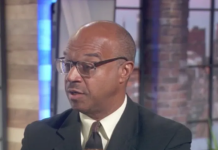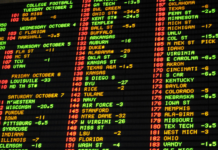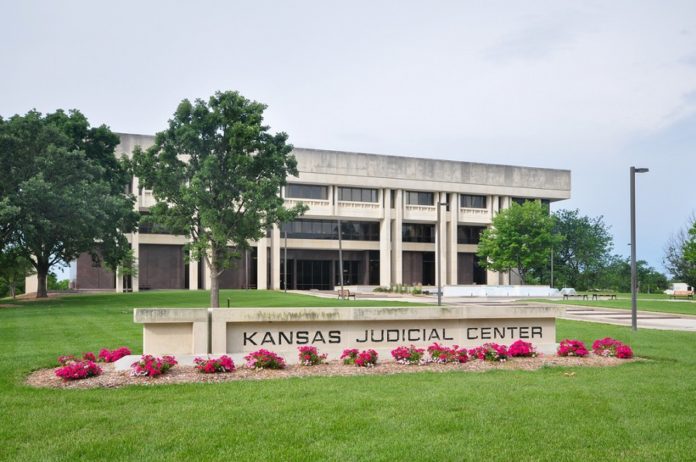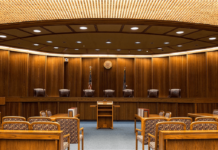(Updated to include reaction from attorney general, Planned Parenthood and add more comments from House debate)
A constitutional amendment calling for the election of justices to the Kansas Supreme Court cleared the Kansas Legislature on Wednesday, setting up a potentially expensive battle at the polls next year when it will be put to voters.
The House put the finishing touches on a years-old debate over how Kansas picks judges for the Supreme Court when it approved the amendment on an 84-40 vote. The amendment had already been approved by the Senate on a 27-13 vote.
The amendment slid by with the minimum of votes required for passage in both chambers with Republican Reps. Jesse Borjon of Topeka, Angel Roeser of Manhattan, Mark Schreiber of Emporia and Sean Willcott of Holton voting against the amendment.
The amendment gives voters a chance to reverse a system that has been in place in Kansas for nearly 70 years. The measure will go on the ballot in August 2026, a primary election when turnout tends to be lower and dominated by Republicans.
The measure, if ultimately approved by voters, scraps a process the state has used since 1958 when Kansans approved a constitutional amendment creating a special nominating commission for screening judicial candidates.
The system came about when former Kansas Gov. Fred Hall maneuvered to get himself appointed to the Supreme Court after leaving office in what is known as the “triple play.” The controversy led voters to amend the constitution to install the current system.
Made up of five lawyers and four nonlawyers, the commission recommends three candidates to the governor to choose from to appoint to the Supreme Court. The lawyers are elected by their peers, and the nonlawyers are appointed by the governor.
Judicial selection is arguably one of the most divisive legal issues that’s been confronting the state for more than a decade and was heightened after the Kansas Supreme Court found a state constitutional right to an abortion in 2019.
The process has been criticized by Republicans over the years who believe the process produces more liberal-leaning judges who have ruled against the death penalty, ordered more money for schools and found the right to an abortion.
During his term as governor, Sam Brownback unsuccessfully tried to get the Legislature to move to a federal model where the Senate confirms the governor’s nominees to the Supreme Court.
He was successful in moving to the federal model for judges who sit on the Court of Appeals because it only required a change in the law and not a constitutional amendment.
“Today marks an historic turning point in Kansas. Voters will now get to decide whether to reclaim the right to vote for justices, which they enjoyed from statehood until 1958,” Attorney General Kris Kobach said in a statement.
Other statewide organizations quickly came out against the amendment Wednesday.
“This is a blatant power grab by extremists who refuse to accept that Kansans have spoken— loudly and repeatedly — for fair courts and personal freedom, including the right to abortion,” said Emily Wales, president and CEO of Planned Parenthood Great Plains.
The amendment “isn’t about judicial integrity,” Wales said. “It’s about rigging the system to
force an agenda that has already been defeated.
“These lawmakers lost in court and at the ballot box. You don’t get to fire the referee when you’re losing the game, and Kansans will see this for exactly what it is. We’ll dust off our Vote No signs and win again,” she said.
The Kansas Trial Lawyers Association saying that the amendment was not warranted.
“We trust Kansas voters will reject this amendment,” the organization said.
“We strongly believe that when voters are exposed to the realities of watching our state’s justices having to raise money and campaign for their seats and the negative impact it will have on our state, they will vote no,” the association said.
Supporters of the amendment said it gives voters a chance to decide who sits on the court rather than relying on what they characterized as a type of secretive Star Chamber where justices are chosen out of public view.
“Citizens of Kansas elected their justices for 98 years but have been excluded from the process for the last 66,” said Republican state Rep. Bob Lewis, a lawyer from Garden City.
“I am confident that if handed the responsibility again, they would elect justices for whom we could be very proud,” Lewis said.
Lewis dismissed the idea that adding politics to picking judges would muddy the state’s judicial system.
“I think politics isn’t a dirty word,” he said.
“I think it’s a means by which we have chosen from the beginning to make major decisions about who runs our lives, and we ought to respect that and rely on it.”
Republican state Rep. Susan Humphries of Wichita, chair of the House Judiciary Committee, said a vote for the amendment should be a slam dunk for lawmakers because it restores power to the voters to select their justices.
“This should be the easiest vote in the world,” Humphries said. “This vote is giving your constituents the power to make that decision for themselves.”
Opponents of the amendment say it will open the door to millions of dollars flowing into judicial elections, potentially putting judges in the position of hearing cases brought by their donors.
“Justice should not be for sale in our state,” said Democratic state Rep. Lindsay Vaughn of Overland Park.
“It is a constitutional right to afford to all of us in a court of law and it should be applied fairly regardless of political influence and regardless of money,” she said.
The Brennan Center for Justice reports that 21 states hold judicial elections, including 14 that hold nonpartisan elections and seven that are partisan.
Candidates, special interest groups, and political parties spent $100.8 million on state supreme court elections during the 2021-22 election cycle, nearly twice the spending in any prior midterm cycle, after adjusting for inflation, the Brennan Center reports.
Outside groups accounted for $45.7 million — or 45.3% — of all money spent, a larger share of the spending than ever before, according to Brennan.
Critics say the amendment would open the door to millions of dollars in outside spending that would potentially open the judiciary to the influence of special interests with cases before justices who receive contributions from those very parties.
They point to a 2009 case from West Virginia where the U.S. Supreme Court ruled that a state Supreme Court justice should have removed himself from an appeal in which he ruled in favor of a coal mining company whose CEO had been a major campaign donor.
Supporters of the amendment say that politics are already enmeshed in the current system, it’s just more hidden that would otherwise be seen in an election.
Humphries noted that a majority of the current screening panel is made up of lawyers, who may also practice before the court.
“There’s a conflict of interest now that we have,” Humphries said.
The proposal stipulates that three justices — positions one, two and three — would be elected at the general election in November 2028.
Elections for two justices — labeled as positions four and five — would be held in 2030. And two other justices — labeled positions six and seven — would have to run in 2032.
The justices would serve six-year terms.
Decisions about whether the races would be partisan and whether justices would run in election districts wouldn’t be determined until after the amendment passed.
















